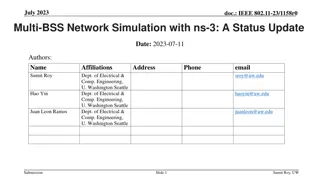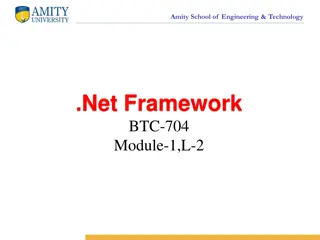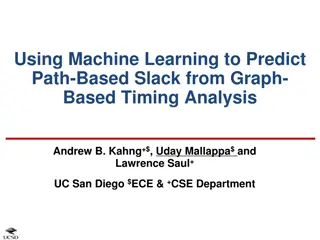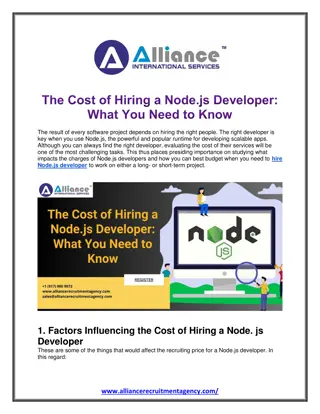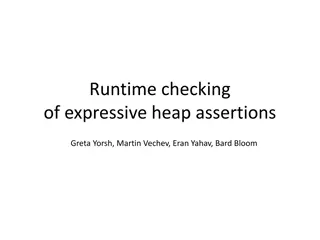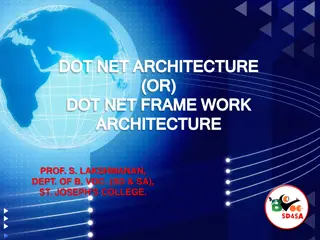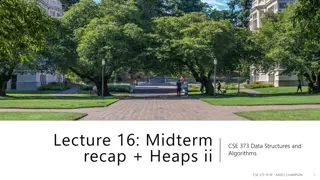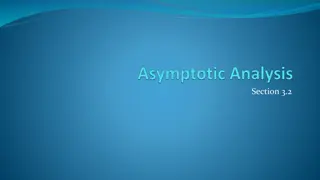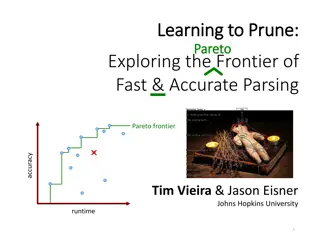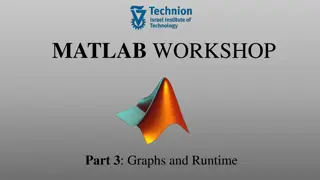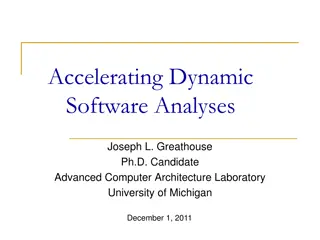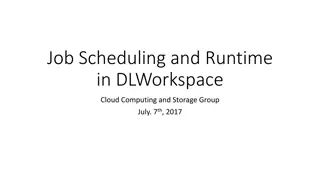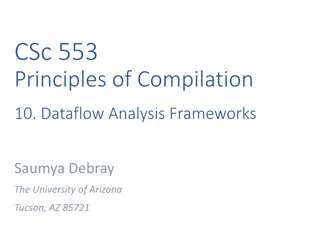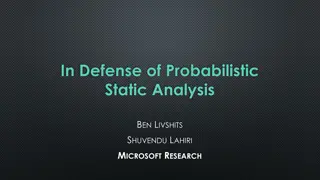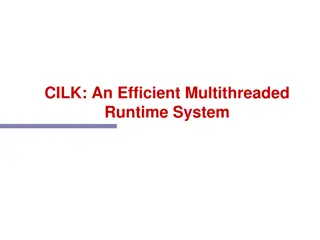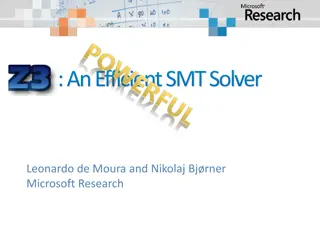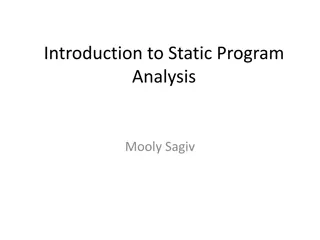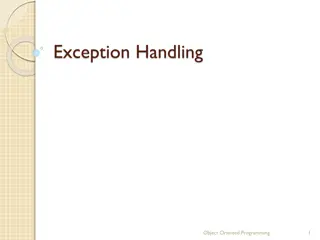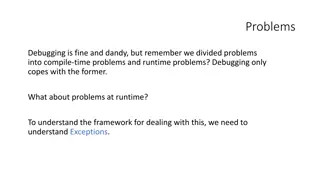Algorithm Analysis
Algorithm analysis involves evaluating the efficiency of algorithms through measures such as time and memory complexity. This analysis helps in comparing different algorithms, understanding how time scales with input size, and predicting performance as input size approaches infinity. Scaling analysi
1 views • 30 slides
Multi-BSS Network Simulation in ns-3 with IEEE 802.11-23 Update
A status update on the WiFi module in ns-3 for IEEE 802.11-23 focusing on advancements like new protocol features, AI/ML integration, and runtime improvements for multi-BSS networks. The simulations cover throughput benchmarks, multi-BSS scenarios, interference parameters, and validation against ana
13 views • 33 slides
Line Segment Intersection
Geometric intersections play a crucial role in computational geometry for tasks such as solid modeling, collision detection in robotics, and overlaying subdivisions in geographic information systems. The problem of line segment intersection involves finding all intersection points between a set of c
0 views • 17 slides
BTR: Binary Token Representations for Efficient Retrieval Augmented Language Models
Retrieval-augmented language models like BTR address issues such as hallucination by providing efficient solutions for encoding input passages and queries. By utilizing cacheable binary token representations, BTR offers a unique approach to decomposing and binarizing passage encoding to improve runt
0 views • 9 slides
Overview of .NET Framework and CLR Architecture at Amity School of Engineering
Explore the .NET Framework and Common Language Runtime (CLR) architecture at Amity School of Engineering & Technology, covering topics such as .NET components, technical architecture, common language runtime, CLR execution model, and more. Discover the support for multiple languages and the .NET lan
0 views • 28 slides
Comprehensive Cost Management Training Objectives
This detailed training agenda outlines a comprehensive program focusing on cost management, including an overview of cost management importance, cost object definition, cost assignment, analysis, and reporting. It covers topics such as understanding cost models, cost allocations, various types of an
4 views • 41 slides
Dynamic Memory Allocation in Computer Systems: An Overview
Dynamic memory allocation in computer systems involves the acquisition of virtual memory at runtime for data structures whose size is only known at runtime. This process is managed by dynamic memory allocators, such as malloc, to handle memory invisible to user code, application kernels, and virtual
0 views • 70 slides
Machine Learning for Predicting Path-Based Slack in Timing Analysis
Utilizing machine learning to forecast path-based slack in graph-based timing analysis offers a solution for optimizing power and area efficiency in the design process. The Static Timing Analysis incorporates accurate path-based analysis (PBA) and fast graph-based analysis (GBA) to estimate transiti
1 views • 31 slides
Exceptions in Computer Science
Errors in programming, such as syntax, semantic, runtime, and logical errors, can disrupt the execution of a program. Syntax errors relate to grammatical violations, semantic errors occur when statements lack meaning, and runtime errors happen during program execution due to illegal operations. By i
2 views • 35 slides
Techniques for Reducing Connected-Standby Energy Consumption in Mobile Devices
Mobile devices spend a significant amount of time in connected-standby mode, leading to energy inefficiency in the Deepest-Runtime-Idle-Power State (DRIPS). This study introduces Optimized DRIPS (ODRIPS) to address this issue by offloading wake-up timer events, powering off IO signals, and transferr
2 views • 31 slides
Advanced Memory Dump Analysis with WinDbg for Developers
Dive into the intricacies of memory dump analysis using WinDbg, focusing on essential techniques like writing memory dumps, collecting evidence, configuring WinDbg, loading dump files, and leveraging key extensions. Gain insights on symbol management, runtime debugging, and more to effectively troub
1 views • 21 slides
Optimizing Multi-Scalar Multiplication Techniques
Delve into the world of optimizing multi-scalar multiplication techniques with a focus on improving performance, especially in Zero Knowledge Proofs systems using elliptic curves. Explore algorithmic optimizations like the Bucket Method by Gus Gutowski and learn about the runtime breakdown, motivati
3 views • 52 slides
Proposal for Updating End-to-End Test Smoketests Using Python SDK
Addressing the current scenario and problems encountered in running E2E tests for VNF. Proposals for a 3-stage E2E test setup, including test preparation, vendor and LCM creation, runtime complexities, and cloud region configurations. Suggestions for utilizing SO Openstack and MultiCloud VIM adapter
2 views • 5 slides
Debugging in Programming
Debugging is a crucial aspect of programming to identify and fix errors that can cause program failures, hangs, or unexpected results. There are different types of errors such as compile errors, runtime errors, and logic errors, each requiring a different approach to resolve. Learning about the mode
0 views • 20 slides
The Cost of Hiring a Node.js Developer What You Need to Know
The result of every software project depends on hiring the right people. The right developer is key when you use Node.js, the powerful and popular runtime for developing scalable apps. Although you can always find the right developer, evaluating the cost of their services will be one of the most cha
0 views • 6 slides
Runtime Checking of Expressive Heap Assertions
Motivated by the unreliability of large software systems due to concurrency bugs and limitations of static analysis, the goal is to enable runtime analysis of deep semantic properties with low overhead. This involves checking expressive heap assertions at runtime with minimal impact on performance,
0 views • 15 slides
.NET Framework Architecture and Common Language Runtime
This content delves into the intricacies of .NET architecture, highlighting its structure, common language runtime, and key components such as Common Type System (CTS) and Common Language System (CLS). It explains how .NET supports multiple languages, facilitates cross-language interoperability, and
0 views • 13 slides
Implementing Heaps: Node Operations and Runtime Analysis
Understanding the implementation of heaps involves knowing various node operations like finding the minimum node, last node, next open space, children, and parent. The runtime analysis of heap operations such as peekMin, removeMin, and insert are crucial for optimizing performance. This recap covers
0 views • 9 slides
Dynamic Memory Management Overview
Understanding dynamic memory management is crucial in programming to efficiently allocate and deallocate memory during runtime. The memory is divided into the stack and the heap, each serving specific purposes in storing local and dynamic data. Dynamic memory allocators organize the heap for efficie
0 views • 31 slides
Big-Oh Notation in Time Complexity Analysis
Big-Oh notation in algorithm analysis signifies how the runtime of an algorithm grows in relation to the input size. It abstractly characterizes the worst-case time complexity, disregarding constants and lower-order terms. The concept of Big-Oh, along with Big-Omega and Big-Theta, helps in comparing
0 views • 18 slides
Exploring Fast & Accurate Parsing With Learning to Prune
In this informative content, the concept of learning to prune is discussed in the context of exploring the frontier of fast and accurate parsing. It delves into the optimization tradeoff between runtime and accuracy in end-to-end systems, showcasing a Pareto frontier of different system performances
0 views • 42 slides
MATLAB Workshop: Graphs, Runtime Analysis, and Plotting Techniques
MATLAB Workshop Part 3 delves into the creation of 2D and 3D plots, along with advanced plotting commands, runtime analysis using tic and toc functions, and the utilization of the MATLAB profiler. The content demonstrates techniques for plotting multiple curves, creating subplots, and visualizing da
0 views • 22 slides
Runtime Recovery of Web Applications under Zero-Day ReDoS Attacks
This detailed content discusses the critical issue of Runtime Recovery of Web Applications facing Zero-Day ReDoS Attacks. It delves into the significance of regular expressions (regex) in handling HTTP requests, highlighting vulnerabilities and real-world impacts. The research emphasizes the severit
0 views • 31 slides
The Challenges of Dynamic Software Analysis
Delve into the world of dynamic software analyses, exploring the prevalence of software errors, modern bug examples, runtime overheads, and proposed solutions in this field. Learn about the complexities of analyzing programs as they run and the associated risks and considerations.
0 views • 39 slides
Introduction to Static Analysis in C.K. Chen's Presentation
Explore the fundamentals of static analysis in C.K. Chen's presentation, covering topics such as common tools in Linux, disassembly, reverse assembly, and tips for static analysis. Discover how static analysis can be used to analyze malware without execution and learn about the information that can
1 views • 54 slides
Efficient Job Scheduling and Runtime Management in DLWorkspace Cloud Computing and Storage Group
Explore the intricate system of job scheduling and runtime management in DLWorkspace, involving SQL server, K8s Master API, Web Portal, Restful API, Cluster Manager, NVIDIA driver plugins, and shared storage. Learn about the process flow from job submission to approval, status monitoring, and device
0 views • 11 slides
Industrial, Microbiological & Biochemical Analysis - Course Overview by Dr. Anant B. Kanagare
Dr. Anant B. Kanagare, an Assistant Professor at Deogiri College, Aurangabad, presents a comprehensive course on Industrial, Microbiological, and Biochemical Analysis (Course Code ACH502). The course covers topics such as Industrial Analysis, Microbiological Analysis, and Biochemical Analysis. Dr. K
1 views • 16 slides
Dataflow Analysis Frameworks in Compilation
Dataflow analysis plays a crucial role in compilation by computing dataflow facts within basic blocks, using transfer functions and merge operators for inter-block analysis. This process helps in achieving convergence iteratively to a fixpoint, ensuring soundness, precision, and efficiency in runtim
0 views • 53 slides
Benefits of Probabilistic Static Analysis for Improving Program Analysis
Probabilistic static analysis offers a novel approach to enhancing the accuracy and usefulness of program analysis results. By introducing probabilistic treatment in static analysis, uncertainties and imprecisions can be addressed, leading to more interpretable and actionable outcomes. This methodol
0 views • 11 slides
CalFuzzer Tutorial: Analysis of Concurrent Programs
CalFuzzer is a dynamic analysis and active testing framework developed by Prof. Koushik Sen's group at UC Berkeley. It provides infrastructure to analyze and test concurrent Java programs, detecting and predicting concurrency bugs. The tool modifies Java bytecode through instrumentation, enabling th
0 views • 19 slides
CILK: An Efficient Multithreaded Runtime System
CILK is a multithreaded runtime system designed to develop dynamic, asynchronous, and concurrent programs efficiently. It utilizes a work-stealing thread scheduler and relies on a directed acyclic graph (DAG) model for computations. With a focus on optimizing critical paths and total work, CILK enab
0 views • 44 slides
Z3: An Efficient SMT Solver
Z3 is an efficient Satisfiability Modulo Theories (SMT) solver that integrates various decision procedures for program analysis, verification, and test case generation. It supports linear arithmetic, bit-vectors, uninterpreted functions, quantifiers, and offers an extensive API for different program
0 views • 16 slides
Static Program Analysis
Static program analysis involves proving correctness, inferring invariants, and detecting errors in code before execution. Challenges include specifying program behavior, writing loop invariants, and using decision procedures for implications. This analysis can help ensure code reliability and ident
0 views • 73 slides
Exception Handling in Object-Oriented Programming
Exception handling in object-oriented programming enables a program to manage and recover from exceptional situations during runtime errors. Java uses exceptions to represent errors, allowing methods to throw exceptions that can be caught and handled by the caller, thus separating error detection an
0 views • 21 slides
Python Exceptions for Handling Runtime Problems
Exceptions in Python are essential for handling runtime problems and preventing programs from crashing unexpectedly. By using try-except blocks, developers can catch and manage exceptions that occur during program execution, ensuring smooth functioning. Learn how to effectively utilize exceptions to
0 views • 15 slides
Facade: A Compiler and Runtime for Object-Bounded Big Data Applications
Facade is a compiler and runtime designed to address challenges related to big data applications, focusing on reducing GC time, memory consumption, and access costs while improving scalability. The system utilizes off-heap native memory and bounded object pooling techniques to enhance performance an
0 views • 23 slides
Intel Cilk Plus: Programming Dynamic Multithreaded Applications
Intel Cilk Plus is a powerful tool for programming dynamic multithreaded applications on shared-memory multiprocessors. This technology extends the C language with keywords like cilk_spawn, cilk_sync, and cilk_for, making it easier to harness the power of parallelism. Cilk's runtime system manages l
0 views • 15 slides
MORE GRAPH ALGORITHMS
This content covers various graph algorithms such as connectedness, strongly connected, transpose of a graph, runtime analysis, and minimum spanning trees. It explains how these algorithms work, their significance, and the runtime complexities associated with them. The content also delves into the c
0 views • 78 slides
Adaptive Online Scheduling in Storm
Leveraging adaptive scheduling techniques in the Storm framework to optimize network traffic by grouping communicating executors, this paper explores offline and online scheduling strategies for efficient data processing in high throughput streams. By using heuristics and runtime analysis, network c
0 views • 58 slides
MAUI: Enabling Fine-Grained Code Offload for Resource-Intensive Smartphone Applications
MAUI (Mobile offload code with fine-grained control) facilitates computational offload for smartphone applications, offering an alternative to VM-based techniques. With a modern language runtime, MAUI enables fine-grained offload by identifying code and data within running programs for migration to
0 views • 20 slides

